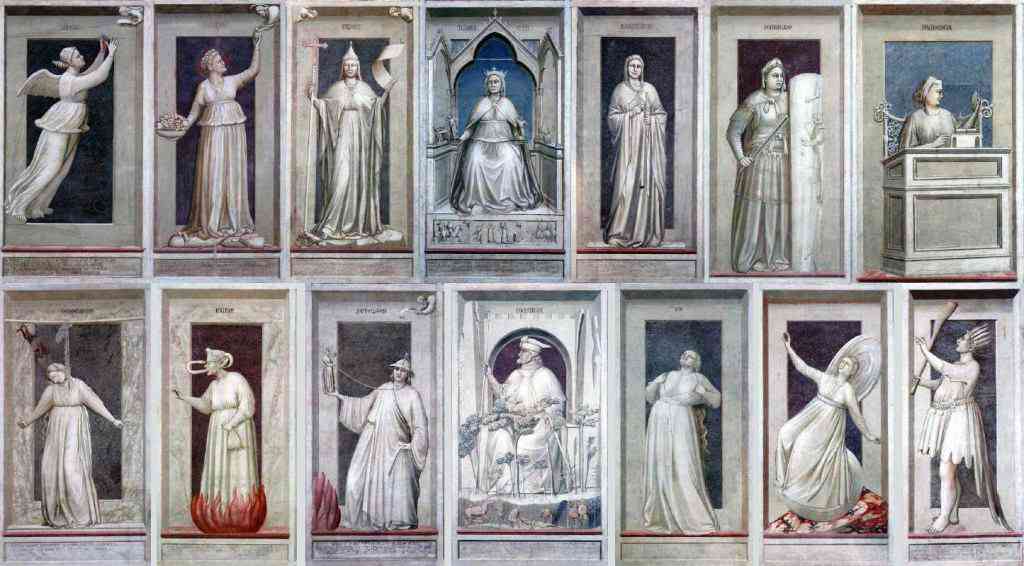The seven virtues are a teaching of ancient psychology, starting from the Greek philosophies of Plato and Aristotle and later developed within Christian theology.
The concept of virtue (virtutem, “force, power, strength, high character, valor”) gives a meaningful structure with which to build one’s life around.
Virtue has two keys.
First, virtue comes from within, it is internal rather than external motivation. Virtues can be taught and gained through practice, but only if they are first known and valued.
Second, virtue is in relativity with vice, or sin (hamartia, “to miss the mark”). In gnostic psychology, the virtue exists within the vice, and must be extracted as a precious jewel is extracted from raw ore.
Virtue is earned through the work of becoming conscious of our psychological defects, and through comprehension and repentance (metanoia, “renewal of mind”) thereby liberating the virtue.
In this way the virtue is alive, intrinsic, well-earned, a bit of the grace of God shining on Earth.

In the above painting by Giotto di Bondone, and in other similar classical works of art, the virtues are characterized as upright and centered. They are aligned with a higher purpose, the connection between Heaven and Earth is in the proper configuration.
The vices on the other hand are off-kilter, slightly twisted or sideways, distorted. The vices take us off the path with the promise of reward without effort or sacrifice.
The strange thing is how vices seem normal, healthy, and universal, while the virtues seem out of touch, fussy, old-fashioned, or even oppressive and dangerous. It is necessary to observe and see for yourself what the continued indulgence of vice does to your mind, life, and happiness, and decide if working toward virtue is worth a try.

Chastity
Chastity is purity, found buried within the sin of lust. Chastity is fidelity to the inner Being, the inner God, with an understanding of the profound sacredness of the sexual energy. Sexuality is meant to be an expression of love- human and divine, in flow with the universal movement of life.
Lust is not to be confused with healthy and normal sexual appetite. Lust is a perversion of the sexual energy which can manifest in even subtle behaviors, but upon observation is a voracious and unending craving for sensation. Lust corrupts and drains us; chastity revives our internal energies with love.
Temperance
Temperance is balance, moderation, and sobriety. Temperance brings clarity in the face of temptation for consumption, be it of food, substances, impressions, or experiences. Temperance allows space to exist between the desire for satiation and the particular temptation. Temperance allows us to “eat to live, not live to eat.”
Gluttony is the vice that masks temperance. Gluttony is the desire for an excess or variety of sensations. This can manifest as over-consumption of food, substances, impressions, and experiences. Gluttony can destroy our body and mind with the overload of consumption.
Charity
Charity is opening up our hearts with generosity toward others. We can be charitable with time, energy, listening, as well as with money, food, goods and services. We can have a charitable attitude toward our fellow humans by giving them the benefit of the doubt, suspending quick judgements, and avoiding accusation and condemnation.
Greed is holding onto our resources, be it physical, psychological, or energetic. Greed never willingly shares information, time, energy, or resources. If it does share it is with great reluctance. Greed distorts the energy around itself into a kind of black hole; there is a vacuum in place of the natural give and take exchange that makes human interactions so life affirming.
Diligence
Diligence is related to what the Buddhists call Right Effort. Work and persistence for the sake of the upright ethical nature of work. Work is necessary for life, everything in nature has some sort of duty to fulfill, which gives meaning and purpose.
Sloth is laziness of effort. Sloth means not working properly, not fulfilling one’s cosmic duty, which could appear as the classic “couch potato” or as being busy all the time with useless tasks. Sloth is inattentiveness, lack of prioritization, and losing touch with the joyful rhythm of right effort.
Patience
Patience is the ability to forgive people and situations that are troubling, difficult, or disruptive. Patience is always tested in relation to the difficulty of the circumstances, there is no virtue of patience if everything and everyone around us is pleasant. Patience is not merely an outer show of passivity, but a state of serenity and deep acceptance of reality.
Anger is the vice that blocks patience. Anger objects to reality, to the circumstances. Anger feels that things should be different and rages outwardly or inwardly in a useless and painful expression of turmoil.
Kindness
Kindness, compassion, altruism, fraternity.
“But I say unto you, Love your enemies, bless them that curse you, do good to them that hate you, and pray for them which despitefully use you, and persecute you; that you may be the children of your Father which is in heaven…”
-Matthew 5:44–46.
“Jesus said unto him, you shall love the Lord your God with all your heart, and with all your soul, and with all your mind. This is the first and great commandment. And the second is like unto it, you shall love your neighbor as yourself. On these two commandments hang all the law and the prophets.”
-Matthew 22:37-40
Kindness is contrasted with envy, a hatred of one’s neighbor for their happiness or prosperity. To understand our interconnectedness and interdependence is to know that our neighbor’s happiness is our own, and that kindness and compassion is the way to fulfill these most important commandments.
Humility
Humility is reverence for the Being, for the Divine Mother, for God who gave us this body and soul. Humility is the natural reaction of the essence to the miracle of existence and creation. Humility is the willingness to work in the rituals of the spirit, to renounce the ego, and to not try to be special, either especially good or especially bad.
Pride is the false sense that we are separate from God, separate from our inner Being, separate from each other. Pride is subtle, yet profoundly intertwined with our suffering. Dissolve pride and let it go so that the simple joy of humility can shine.

